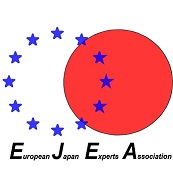 European Japan Experts Association (EJEA) and
European Japan Experts Association (EJEA) and
Institute for Security & Development Policy

jointly organize the conference
Integration and Disintegration in the Japanese Vision of Society 5.0:
A Model for an Open Society in Europe?
supported by Japan World Exposition 1970 Commemorative Fund of KANSAI OSAKA 21st Century Association
Date: April 13th and 14th 2018
Venue: Yasuragi, Hamndalsfägen 6, 132 81 Saltsjö-Boo, Sweden
supported by:



program brochure (with CVs and abstracts, pdf-file)
Friday April 13, 2018
11:30 Registration
12:00 Lunch Buffet
13:00 Opening and Welcoming Remarks by the Organizers
Institute for Security and Development Policy (ISDP):
Dr. Niklas Swanström, Director, ISDP
Dr. Lars Vargö, Former Swedish Ambassador to Japan, Program Manager, ISDP Stockholm Japan Center
Prof. Dr. Dietrich Albert, Graz University (Austria), EJEA Chairman
Prof. Dr. Anders Törnvall, Linköping University (Sweden), EJEA Executive Member
Sabine Ganter-Richter, Network for Science (Germany), EJEA Executive Manager
13:20 Dr. Anne Haglund-Morrissey, Senior Policy Officer, Directorate General Research and Innovation at the European Commission
“EU-Japan Cooperation in Research and Innovation“
14:00 Dr. Yuko Harayama, Executive Member, Council for Science, Technology and Innovation (CSTI), Cabinet Office (Japan)
“Society 5.0 – Since its Inception to Today”
14:40 Coffee Break
15:10 Dr. Irene Ek, Senior Digitalisation Analyst at the Swedish Agency for Growth Policy Analysis, (Sweden)
“Unlocking the Transformative Power of Digital Technologies – Digital Maturity in Swedish Firms“
15:50 Prof. Dr. Ulrike Schaede, Director of the Japan Forum for Innovation and Technology at the UC San Diego (USA)
“Japan in the Digitalization Disruption: How Government, Business and People Embrace Artificial Intelligence, the Internet of Things, and the ‘Connected Society‘”
16:30 Enjoy Onsen and Recreation Facilities at Yasuragi
19:00 Conference Dinner and Networking
Saturday April 14, 2018
9:00 Prof. Dr. Heinz-Dieter Kurz, Graz Schumpeter Centre, University of Graz (Austria)
“How Smart Machines Transform the Economy: Economic Opportunities and Risks of New Technologies”
9:40 Prof. Dr. Akira Ninomiya, Former Vice-President of Hiroshima University and former President of Hijiyama University (Japan)
“New Trends of National Curriculum Changes and Revisions to Prepare the Young Generation for the Future Changing Society of Innovation, Globalization and Digitalization“
10:20 Dr. Lars Vargö, Former Ambassador of Sweden to Japan, Program Manager at ISDP Stockholm Japan Center (Sweden)
“Speak Softly and Carry No Sticks – Japan’s Smart Power”
11:00 Coffee Break
11:30 Parallel Workshops
Workshop 1: “Robots for a More Human World”
Organizer:
M.Sc. Adam Hagman, Robotdalen ABB and Mälardalen University (Sweden)
Workshop 2: “Psychological and Pedagogical Aspects in Ongoing Digital Transformation”
Organizers:
Prof. Dr. Gisela Trommsdorff, Dept. of Psychology, University of Konstanz (Germany),
Prof. Dr. Masashi Urabe, Inst. of Comparative & International Education, Hiroshima City University (Japan)
Workshop 3: “What are the Future Challenges for Japan’s Security”
Organizers:
Dr. Lars Vargö, Former Swedish Ambassador to Japan, Program Manager at ISDP Stockholm Japan Center (Sweden)
Dr. Niklas Swanström, Director, Institute for Security and Development Policy (ISDP) (Sweden)
Workshop 4: “How to Develop the Economic System for the Future Global Digital Society?”
Organizer:
M.A. Stella Sophie Zilian, Graz Schumpeter Centre, University of Graz (Austria)
Workshop 5: “Knowledge and Communication Management for a Harmonic Global Digital World”
Organizers:
Prof. Dr. Tomoko Kojiri, Faculty of Engineering Science, Kansai University (Japan)
Dr. Nguyen-Thinh Le, Lecturer in Computer SScience Education at Humboldt-Universität zu Berlin (Germany)
Prof. Dr. Kazuhisa Seta, College of Sustainable System Sciences and Graduate SChool of Science, Osaka Prefecture University (Japan)
12:30 Plenum
13:15 Farewell Remarks
13:30 Lunch and Time for Informal Meeting and Networking with EJEA
16:00 – 18:00 EJEA Members Meeting (Closed Session)
Japan’s “5th Science and Technology Basic Plan” mentioned the important concept of ”Society 5.0“. This Japanese vision of a “super smart society“ aims to tackle several challenges. It is related to the digitization of industry, however, not limited to the industrial dimension, it is going beyond towards the digitization across all levels of the society and the (digital) transformation of the society itself. Society 5.0 is about all stakeholders: citizens, industry, government, academia and so forth.
Instead of fostering this process on the level of individual organizations and parts of society, Japan has developed a comprehensive transformational strategy, policy, philosophy and even ethics. It seems to be the furthest reaching plan in this regard and even to be a model for other countries and regions – maybe also for the Nordic Countries and even for Europe? For these reasons it is attracting our attention!
The conference 2018 aims to identify similarities and differences between these far reaching visions of a “super smart society“ in Japan and a “digital ecosystem“ in Northern Europe and the rather pragmatic and fragmented approaches towards a “digital agenda“ in other European countries and the “hyper-connected society” of the European Commission. How could best practice examples be transferred to the other cultural surrounding with its own specific values and perspectives? What can we learn from each other’s experiences and visions?
Given different cultures, values and philosophies in the East and in the West, the comparison between the Japanese vision of “Society 5.0“ and European models for digital societies during the conference promise inspiring and exiting insights into our future way of working and living!
